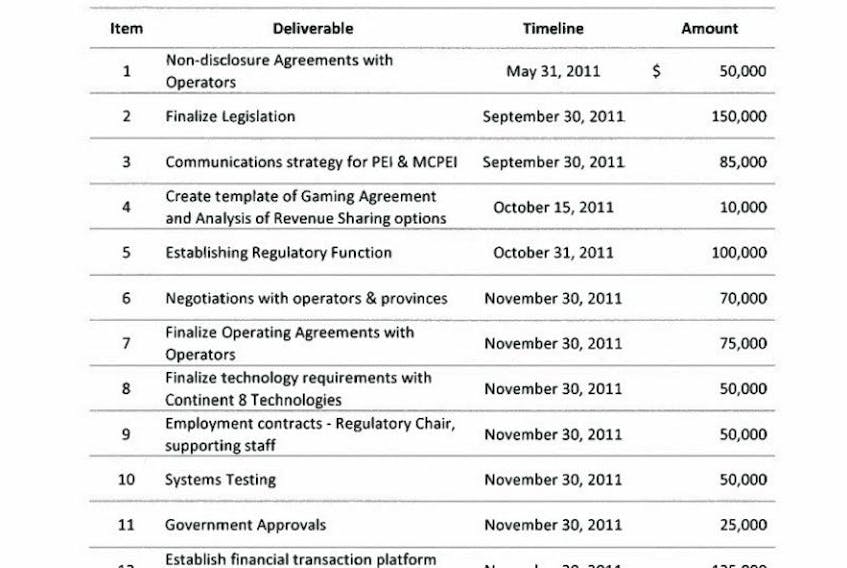The P.E.I. government has finally released a document that outlines details of a $950,000 government loan that funded the province's controversial e-gaming scheme.
The Guardian filed a Freedom of Information request in November 2013, requesting details of the $950,000 loan from Innovation P.E.I. to the Mi’kmaq Confederacy of P.E.I.
Now, more than two years later, Innovation P.E.I. has finally released the one-page document, which outlines what is referred to as the "Proposed Budget" of the e-gaming initiative.
The loan funded the work of a secret gaming committee that worked on a proposal to make Prince Edward Island an Internet gambling regulator for Canada, a plan that would have created tens of millions of dollars in new tax and licensing revenues for both the P.E.I. and Mi’kmaq governments.
The document released to The Guardian Monday is a breakdown of deliverables intended to try to turn the e-gaming scheme into a reality.
Thousands were spent on legal and technical work, including $150,000 to “finalize legislation,” which was scheduled for completion by Sept. 30, 2011. Another $85,000 was spent on a communications strategy for the province and the Mi’kmaq Confederacy, which was also to be complete by Sept. 30, 2011.
Money was also spent on hashing out the regulatory regime to make the e-gaming plan work, including $100,000 to establish a regulatory function and $50,000 for employment contracts for a regulatory chair and supporting staff.
Work on some of the deliverables listed began long before the actual loan agreement was approved, which meant costs for this work were for reimbursements.
The Mi’kmaq Confederacy of P.E.I. (MCPEI) was one such beneficiary, getting $100,000 of the loan money for “expenditures already funded.”
Don MacKenzie, executive director of MCPEI and one of the members of the gaming committee, said Monday the amounts outlined in this document were the budgeted figures and represent “a fair outline of the project work and expenditures.”
“All funds were spent on the joint provincial/Mi'kmaq governments' project to create a regulatory framework in relation to the unregulated online gaming industry,” he said in an email to The Guardian.
Funds were paid to the private law firm, McInnes Cooper, for legal services and for work the firm provided co-ordinating the engagement of technical experts for such initiatives as the transaction platform, technology-based game oversight and legislative and regulatory drafting, MacKenzie said.
“McInnes Cooper's work on the file was over a period of a few years. Creating a regulatory framework was a substantial project that involved a number of professional services being provided. While the province and MCPEI were partners in this endeavour, it was always agreed that the province would fund the development of it. Prior to the $950,000 being advanced, MCPEI covered $100,000 worth of professional expenses, on the condition that the sum would be reimbursed by the province, which occurred. All funds were used to pay legal/technical/professional fees associated with creating the regulatory framework.”
But some of the proposed expenditures raise questions, such as why $25,000 was budgeted for “government approvals” and what happened to $75,000 budgeted to “finalize operating agreements with operators,” considering the e-gaming plan was scrapped long before it got to the stage of finalizing agreements.
Questions will also be raised about $135,000 budgeted to “establish the financial transaction platform,” as the only part of this aspect of the e-gaming plan that materialized was a $60,000 report completed by the U.K. firm Simplex.
The Guardian requested copies of the legislation and contracts listed in this document from the province, but they were not provided.
“As the project did not proceed, the regulatory function was not established, however work was performed on what would be required to establish that function,” the province said in an emailed statement.
“This work was technical in nature. No government officials or employees were beneficiaries.”
The document was released thanks to a ruling last month by Privacy Commissioner Karen Rose. Innovation P.E.I. had 30 days to file a judicial review of this ruling, but chose instead to release the document ahead of the 30-day deadline.
The P.E.I. government has finally released a document that outlines details of a $950,000 government loan that funded the province's controversial e-gaming scheme.
The Guardian filed a Freedom of Information request in November 2013, requesting details of the $950,000 loan from Innovation P.E.I. to the Mi’kmaq Confederacy of P.E.I.
Now, more than two years later, Innovation P.E.I. has finally released the one-page document, which outlines what is referred to as the "Proposed Budget" of the e-gaming initiative.
The loan funded the work of a secret gaming committee that worked on a proposal to make Prince Edward Island an Internet gambling regulator for Canada, a plan that would have created tens of millions of dollars in new tax and licensing revenues for both the P.E.I. and Mi’kmaq governments.
The document released to The Guardian Monday is a breakdown of deliverables intended to try to turn the e-gaming scheme into a reality.
Thousands were spent on legal and technical work, including $150,000 to “finalize legislation,” which was scheduled for completion by Sept. 30, 2011. Another $85,000 was spent on a communications strategy for the province and the Mi’kmaq Confederacy, which was also to be complete by Sept. 30, 2011.
Money was also spent on hashing out the regulatory regime to make the e-gaming plan work, including $100,000 to establish a regulatory function and $50,000 for employment contracts for a regulatory chair and supporting staff.
Work on some of the deliverables listed began long before the actual loan agreement was approved, which meant costs for this work were for reimbursements.
The Mi’kmaq Confederacy of P.E.I. (MCPEI) was one such beneficiary, getting $100,000 of the loan money for “expenditures already funded.”
Don MacKenzie, executive director of MCPEI and one of the members of the gaming committee, said Monday the amounts outlined in this document were the budgeted figures and represent “a fair outline of the project work and expenditures.”
“All funds were spent on the joint provincial/Mi'kmaq governments' project to create a regulatory framework in relation to the unregulated online gaming industry,” he said in an email to The Guardian.
Funds were paid to the private law firm, McInnes Cooper, for legal services and for work the firm provided co-ordinating the engagement of technical experts for such initiatives as the transaction platform, technology-based game oversight and legislative and regulatory drafting, MacKenzie said.
“McInnes Cooper's work on the file was over a period of a few years. Creating a regulatory framework was a substantial project that involved a number of professional services being provided. While the province and MCPEI were partners in this endeavour, it was always agreed that the province would fund the development of it. Prior to the $950,000 being advanced, MCPEI covered $100,000 worth of professional expenses, on the condition that the sum would be reimbursed by the province, which occurred. All funds were used to pay legal/technical/professional fees associated with creating the regulatory framework.”
But some of the proposed expenditures raise questions, such as why $25,000 was budgeted for “government approvals” and what happened to $75,000 budgeted to “finalize operating agreements with operators,” considering the e-gaming plan was scrapped long before it got to the stage of finalizing agreements.
Questions will also be raised about $135,000 budgeted to “establish the financial transaction platform,” as the only part of this aspect of the e-gaming plan that materialized was a $60,000 report completed by the U.K. firm Simplex.
The Guardian requested copies of the legislation and contracts listed in this document from the province, but they were not provided.
“As the project did not proceed, the regulatory function was not established, however work was performed on what would be required to establish that function,” the province said in an emailed statement.
“This work was technical in nature. No government officials or employees were beneficiaries.”
The document was released thanks to a ruling last month by Privacy Commissioner Karen Rose. Innovation P.E.I. had 30 days to file a judicial review of this ruling, but chose instead to release the document ahead of the 30-day deadline.
To see the document in its entirety, visit The Guardian's website.
The “Proposed Budget” for the $950,000 e-gaming loan:
1. Non-disclosure agreements with operators - $50,000
2. Finalize legislation - $150,000
3. Communications strategy for P.E.I. and MCPEI - $85,000
4. Create template of Gaming Agreement and analysis of revenue sharing options - $10,000
5. Establishing regulatory function - $100,000
6. Negotiations with operators and provinces - $70,000
7. Finalize operating agreements with operators - $50,000
8. Finalize technology requirements with Continent 8 Technologies - $50,000
9. Employment contracts – regulatory chair, supporting staff - $50,000
10. Systems testing - $50,000
11. Government approvals - $25,000
12. Establish financial transaction platform for P.E.I. - $135,000
13. Reimburse MCPEI for expenditures already funded - $100,000









